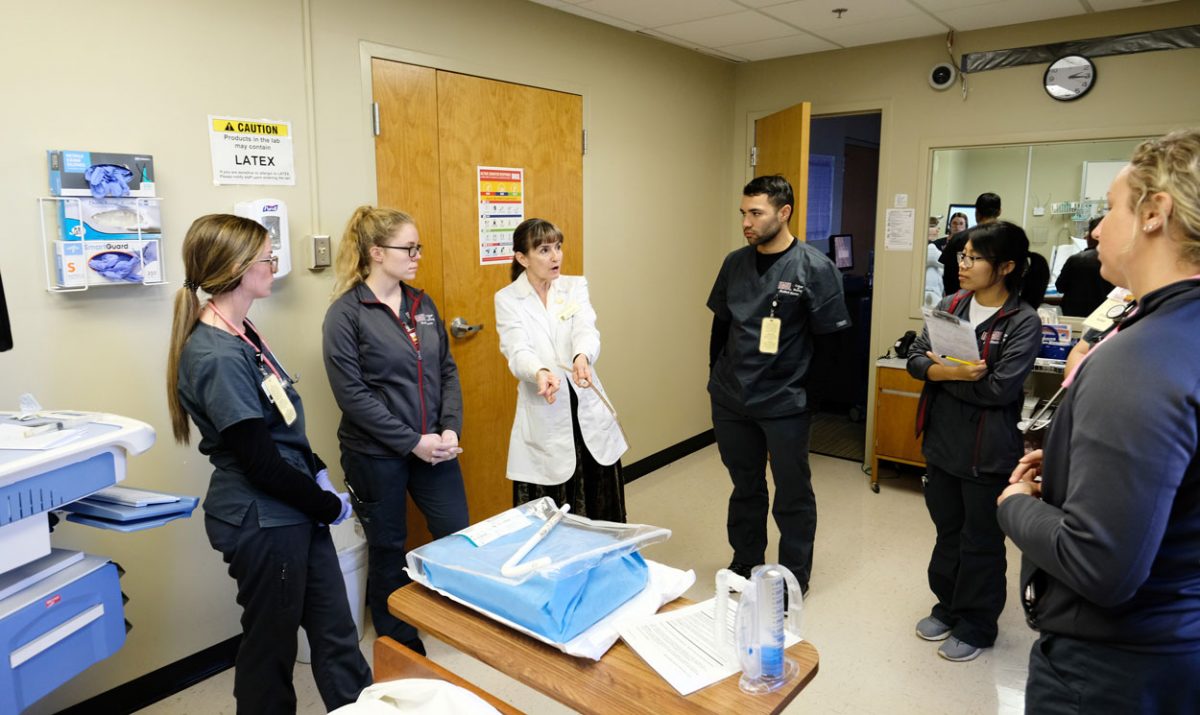
The College of Nursing is launching a new nurse educator program that will provide nurses who want to teach with a background in adult education principles. (Photo by August Jennewein)
There is a well-documented, urgent need for nurses both in Missouri and throughout the country – according to the U.S. Chamber of Commerce, 42 out of the 50 U.S. states will likely experience shortages in nursing staff by the year 2030. With those projected shortages on the horizon, the need for highly trained faculty to prepare those entering the nursing workforce is critical.
In order to meet that need, the College of Nursing at the University of Missouri–St. Louis plans to launch a new nurse educator program designed to increase the educational preparation of Missouri nursing faculty with BSN degrees. The Missouri State Board of Nursing recently awarded the College of Nursing $519,050 in Nursing Education Incentive Program funding that will be used to develop a 12-credit online graduate nurse educator certificate program launching in 2026.
NEIP grants were established in 2011 in order to increase the physical and educational capacity of professional nursing programs in Missouri. The grant funding will support the College of Nursing in developing and implementing the certificate curriculum, hiring new faculty and providing scholarships for students.
Although the National Council of State Boards of Nursing and American Association of Colleges of Nursing require that nursing faculty in undergraduate programs hold a master’s or doctoral degree in nursing, some states are working to lower minimum educational requirements in light of faculty shortages. In the wake of the COVID-19 pandemic, the Missouri State Board of Nursing changed its regulations to allow nurses who hold a BSN with a clinical component, such as an associate or LPN degree, to teach.
UMSL’s new certificate program will provide these nurses with a background in adult education principles that can help them better support nursing students in developing effective learning techniques to maximize the benefits of their experience and knowledge. The program will offer advanced training in curriculum development, teaching methodologies and leadership skills.
“What we know is that they don’t necessarily have all the right tools in their belt to be able to teach appropriately with just a bachelor’s degree,” said Norma-Hall Thoms, the dean of the College of Nursing. “Our graduate nursing certificate will prepare nurse educators so that the folks who are already in that BSN role and are teaching will get a little bit broader skillset in terms of being academically prepared to teach and do things like test construction and evaluation.”
Amanda Finley, the nurse educator track coordinator and an assistant teaching professor in the College of Nursing, will be developing the curricular content for the certificate program. The college previously offered a master’s program in nurse education, and she plans to rework some of those courses for current times, focusing on topics such as learning theory, curriculum development, evaluation strategies and teaching strategies. She wants the program to be useful for nurses who plan to teach in a variety of settings, from current DNP and PhD students to BSN graduates looking to teach in LPN or ADN programs.
“They’re going to have that clinical expertise that the students need, but what they don’t have is the expertise to put together a meaningful learning experience for students and make sure that students are mastering what we’re hoping for them to learn,” she said. “We want to try to help make sure that we can arm these people who are already expert clinicians with the knowledge that they need to become expert educators and provide excellent education to students at all of the different levels where we educate students.”
The 12-credit program will likely take about three semesters to complete and will be offered online to accommodate nurses who are currently working in the field. The College of Nursing faculty hopes this will also make the program more accessible to nurses working across the state, particularly in rural areas.
“One of the beauties of online education is that we can meet people where we are,” Finley said. “Since it’s going to be online, it allows us to reach out to folks who are not just within the metro area, but also in some of these more rural areas that are often called educational deserts. Maybe they have a community college that has an LPN program or an ADN program, but they don’t have advanced nursing education where the educators can access those courses and educational theory curriculum development. We can take the expertise we have here and bring it to a wide variety of people in all kinds of places so that they can educate the future of our nursing workforce throughout the state.”
The grant funding will also be used to support BSN-prepared nurses who wish to pursue faculty positions in obtaining the graduate certificate in nursing education through UMSL. Scholarships will be provided to students who commit to teaching in a Missouri school of nursing for three or more years after completing the certificate.
“With the scholarship piece of the grant, we’re hoping to fund in the neighborhood of about 75% of their tuition, which is significant because the goal is we want students in the program,” Hall-Thoms said. “Part of how we do that is by making the tuition and program affordable and accessible. We certainly already have the accessibility built in with it being online. The other piece that we need to make sure we have in place is the financial accessibility, so that’s why a pretty significant portion of the grant will be going toward being able to fund students to enroll in the program.”
Nursing faculty will begin implementing the program next semester, and the College of Nursing will officially begin admitting students to the certificate program in spring 2026.














